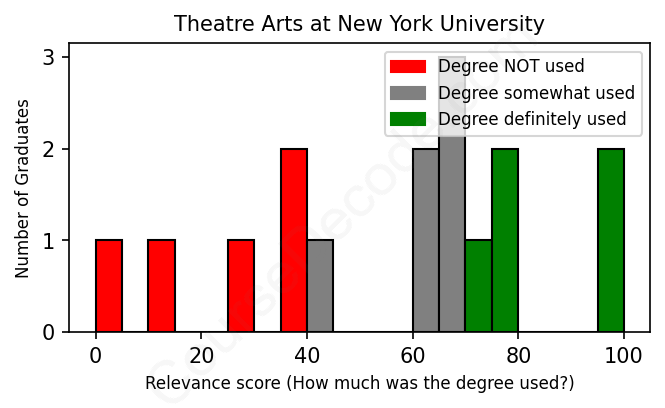
First, some facts. Of the Theatre Arts graduates from New York University we've analyzed , here's how many have used (or NOT used) their degree in their career:

These are estimates based on AI analysis of 16 LinkedIn profiles (see below).
The verdict? Significantly below average. Overall, with an average relevance score of 56%, Theatre Arts graduates from New York University have a much lower likelihood (-11%) of finding work in this field compared to the average graduate across all fields:
And for comparison, here's the chart for all profiles we've looked at across all degrees.
Also, after graduating, only 12% of these graduates have pursued further education other than another Bachelor's degree (such as a Masters degree or other), compared to the average across all profiles of 35%. This suggests a Bachelors degree is enough for most Theatre Arts graduates, and it's normal to look for work straight after graduation.
See the details:
|
Relevance score: 28% We think this person has NOT gone into a career related to their degree. We think this person has NOT gone into a career related to their degree.
DEGREE INFOGraduated in 2017 from New York University with a Bachelor of Fine Arts - BFA in Theatre Arts. No other secondary education since. JOB HISTORY SINCE GRADUATIONWriter and Copyeditor Paradigm Press Apr 2019 - Nov 2023 Professional Matchmaker  Three Day Rule Matchmaking 2021 - Nov 2023 Recruiting Coordinator  The D. E. Shaw Group Nov 2023 - May 2024 ABOUTHighly skilled Recruiting Coordinator with a proven track record in managing full-cycle recruitment processes for diverse positions. Proficient in utilizing ATS for candidate pipeline management and recruitment metric analysis. Known for fostering close relationships with recruiters, hiring managers, and stakeholders to optimize recruitment practices. Accomplished Professional Matchmaker recognized for managing a robust client roster, exceeding matching goals consistently, and generating substantial revenue through upselling. Experienced in conducting client intake meetings, interviews, and providing personalized matchmaking experiences. Awarded for exceptional problem-solving and collaboration skills. Freelance Writer and Copy Editor with a keen eye for detail and creativity. Led content creation for a high-traffic eNewsletter, driving significant engagement growth. Skilled in conceiving, researching, and editing informative and engaging content across various platforms. Professional Actress with six years of experience performing in various productions in New York City. Leveraged acting skills to enhance communication and presentation abilities in diverse professional settings. |
The top 10 most common jobs done by the graduates we've analyzed (ranked most common to least) are:
When it comes to graduates from New York University's Theatre Arts program, there seems to be a mixed bag of job experiences. A common theme among the profiles you analyzed is that while some individuals have landed roles that are directly relevant to their field—like associate producers, artistic directors, and actors—many others have ventured into positions that are less about theatre and more about general skills like customer service, administrative tasks, or marketing. For instance, roles such as bartenders, sales associates, and community managers don’t really tap into the core skills taught in a Theatre Arts program, which often focuses on performance, production, and artistic direction.
Interestingly, those who do manage to find relevant jobs often hold positions that involve significant creative input or production management, like producers and actors, which utilize the techniques and skills learned during their studies. But with so many in roles that seem disconnected from their training, it's clear that having a degree in Theatre Arts doesn't necessarily guarantee a career in the arts. Instead, many graduates may find themselves in various industries where their soft skills, such as communication and teamwork, are more applicable than the theatrical techniques they studied. So, while there are definitely pathways into the industry, folks in this field might have to be open-minded and adaptable in their job searches.
Here is a visual representation of the most common words in job titles for Theatre Arts graduates (this is across all Theatre Arts graduates we've analyzed, not just those who went to New York University):

It looks like NYU Theatre Arts graduates have a pretty mixed bag when it comes to their career journeys. For starters, many of them seem to kick off their careers with roles that aren't directly tied to the theatre world, like bartending or working in customer service. For instance, grads from 2010 to 2015 often held jobs like bartender, server, or various administrative roles. While these positions might help pay the bills, they aren't exactly glamorous theatrical careers. On a positive note, a good number of graduates do shift towards more relevant roles after a few years, like working as producers, directors, or in creative positions within the theatre and entertainment industries.
Five to ten years out, several graduates manage to land roles that are more closely aligned with theatre, such as producers or educators in artistic settings. Some even start their own companies or take on leadership roles in theatre festivals and productions. However, it's clear that a significant portion of them still find themselves in jobs that might not connect directly to their degree, especially early on. This can be pretty common in the arts, where the path can be winding and unpredictable. So, while you see some who hustle their way into the industry, others might drift into unrelated jobs, showcasing the challenges many face in turning a passion for theatre into a sustainable career.
Getting a Bachelor’s degree in Theatre Arts at NYU can be pretty intense, honestly. The program is well-respected and competitive, which means you'll be surrounded by passionate and talented people who are all striving to make it in the arts. The workload can be heavy, with a ton of rehearsals, performances, and projects to juggle, plus classes that really push your creative limits. So, it's definitely not an “easy A” situation – you’ve got to put in the time, effort, and emotional energy to really thrive. But if you're super into acting, directing, or any part of the theater world, you might find it challenging yet rewarding, like it’s totally worth the grind.
Most commonly, in the LinkedIn profiles we've looked at, it takes people 4 years to finish a Bachelor degree in Theatre Arts.
Alright, so looking at all these NYU Theatre Arts grads and their job histories, it seems like they're still grinding quite a bit in the arts world. Some have held steady roles, like the Co-Founder and Artistic Director who's been at it since they graduated, which probably helps financially. However, many started off in service jobs and internships, which don’t typically pay much, and even those who transitioned into management or creative positions seem to have a mix of freelance gigs and more stable roles. Overall, while some of these folks are likely making decent money now, especially as they climb the ladder or take on multiple roles, it's clear that many of them are navigating a pretty tough industry where financial stability can be hit or miss. So, it’s a journey, but not all of them might be rolling in dough, you know?
Here is a visual representation of the most common words seen in the "about" section of LinkedIn profiles who have a Bachelor degree in Theatre Arts (this is across all Theatre Arts graduates we've analyzed, not just those who went to New York University). This may or may not be useful:

Here are all colleges offering a Bachelor degree in Theatre Arts (ordered by the average relevance score of their Theatre Arts graduates, best to worst) where we have analyzed at least 10 of their graduates:
| College | Score | Count |
|---|---|---|
 New York University New York University
|
56 | 16 |